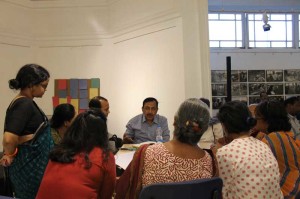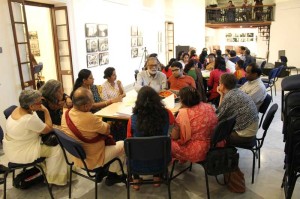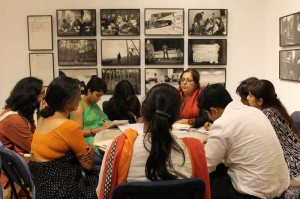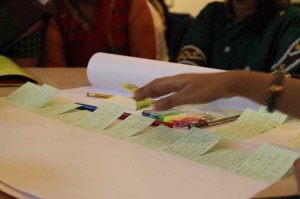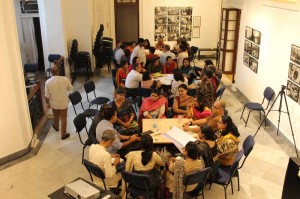One of the most important aims of the conference was to engage with not just the speakers and presenters, but with each and every participant. The World Cafe session in the afternoon of Day 1 proved to be an extremely effective way of getting intense debates going.
- Group discussion leader: Dr Vishwamohan Jha [Reporter: Paroma Sengupta]
We started out with the topic of conversion. One of the teachers from Bangladesh had made a point regarding the upward trend in rates of conversion- from one religion to another. He had been discussing this with Dr Jha earlier and Dr Jha suggested that we continue with the same topic.
Historically, the reason for conversion could probably have been the fact that one converted in order to identify with the ruler, or perhaps to become more important in society. The other reasons identified included the benefits of being a part of a minority, being forced into conversion and to escape oppression from the caste system (a policy in the Hindu religion-state enforced).
The teachers did mention that one must keep in mind what religion was being converted to, and what religion was being converted from and also keep in mind the role of economics.
The discussion then moved on the problems that teachers faced in class. Many of them had noticed that their students seem to be of the opinion that Indians are Hindus. This sensitivity towards other religions would come from classroom dynamics as well as the home front. A few teachers were of the opinion that it stemmed from ignorance and the home front. The teachers agreed that there is bias against communities. For example, equating terrorism with Islam. Teachers also agreed that many of the religious biases and labelling a community were sociological misconceptions, propagated unknowingly. These misconceptions must be countered immediately. Another question raised was do songs at assembly time in school have any religious significance, create any bias? Some teachers spoke about examples from their schools where they have songs from all faiths and the students choose which song they want to sing. One of the teachers from Bangalore mentioned that geography plays an important role when it comes to bias and openness towards religions. For example, Bangalore being such a melting pot of religion, class and culture has very little partition related anguish, and children grow up amongst many religions and show very little bias, if none at all. The common consensus was that students must be equipped to combat bias and face the outside world.
- Group discussion leader: Swaleha Alam Shahzada [Reporter: Joyeeta Dey]
The group started out with the common question- Why do we teach History?
This was discussed in the context of the resistance to learning history that most teachers face. The boredom associated with history in the minds of the students. One teacher suggested this was a function of ‘textbook culture’ which draws from the examination system and that history teaching would become much more interesting without examinations. This point was challenged by a teacher who currently teaches in a school for lower income families, and she talks about how following the norms of the Right to Education her school has abolished examinations and there is still a school-wide disinterest in learning the subject. Yet, even while faced with this mammoth challenge, the teachers were clear-eyed about the need to learn about the past and they all stated the standard reasons such as the role of history in formation of identity, understanding the present and in avoiding the repetition of mistakes. One teacher had the age-old yet unusual opinion that history needs to be taught to train historians and scholars.
The other question that was discussed was- Do textbooks influence the minds of students and does communalism spread through textbooks?
Initially everyone concurred on the understanding that most children don’t hold the textbook as sacred and other forms of popular culture can be much more influential. Then one teacher gave an account of an exercise where she read out the history of partition from the books of Karachi and Karnataka and what a destabilizing and profound impact it had on her students. While this was an example about the positive influence textbook-led activities can have, another teacher provided an anecdote of an instance where the textbooks being taught was creating self-hate amongst the students and alienation from their families by setting up the urban middle class lifestyle as ‘clean’ and the rural conditions as ‘illiterate’ and ‘dirty’.
- Group discussion leader: Anjum Katyal [Reporter: Ayushi Sethia]
The two questions that were discussed were why do we teach history, and can history teaching instil values, if yes what are those values and who decides them.
When asked why history is taught, teachers responded by saying that history is taught to know ones nucleus, and has an important role in shaping mindsets. While teaching history, teachers must give place for debate; use projects (such as the Mock United Nations or MUN as it is popularly called) as a way to know history, use storytelling, drama, activity based learning and group discussion. One could also connect facts taught in history with real life, connect with prior knowledge, and also talk about career options in history studies.
The values that can be taught through history are tolerance, and openness to diversity. One of the questions raised was is it a history teachers job to propagate peace? The participants agreed that that is the responsibility of all teachers, some said no, but teachers can participate in peace making.
Teachers agreed that the major problem is when one has a school syllabus and an exam to factor in. Some said that the problem lies in a fixed textbook that needs to be followed; there should be an organic approach to teaching history. Some argued that point saying that the curriculum is the problem, not the textbook. The issues about textbooks included marginalisation and an imbalance in facts. History teaching cannot be dropped, it is a subject that can be monitored and history textbooks are powerful tools.
- Group discussion leader: Dr. Kavita Panjabi [Reporter: Nayantara Biswas]
‘What constitutes History?’ and ‘What is Objectivity?’ were the two broad questions put forward to initiate the first discussion. Dr. Panjabi began defining ‘hard subjectivity’, which brings out subjects that are being suppressed and is often used in feminist studies. The problem of bringing out multiple perspectives in the classroom was discussed.
Reference was made to Prof. Afsan Chowdhury’s talk earlier in the day, where he spoke about the importance of focusing on the history of the people at the grass root level and how livelihood is a fundamental factor in a person’s life. Here, Deeptha cited an example that she was faced with in her class. The children were asked to go home and look into the challenges that were faced by their domestic workers. The children came back to her and said that they were unable to complete the assignment since they didn’t know how to talk to the help! Deeptha had to work on these children, until they slowly let go of their inhibitions and found out that the workers at their houses also had children who they could not even afford to educate. This was an eye-opener for these privileged children who took things like education for granted.
Dr. Punjabi spoke about an incident in her class at Jadavpur University. During a class discussion, they were discussing the ‘Top 5 Terrorist attacks’ that occurred in the recent past. After citing 4 such incidents, which had occurred in the west, the students mentioned the Godhra riots that plagued the state of Gujarat with gross instances of communal violence. When Dr. Panjabi asked her students how they would have reacted to this same situation in Bengal, the student’s laughed it off, saying that this would never have happened in Bengal. Upon hearing this, Dr. Panjabi brought to their attention the hypothetical existence of terrorist camps all across the state with serious consequences for all those who refused to send their children to this camp. By putting the students in another person’s shoes, she was able to make them gain a different perspective on things. Inspired by this fresh perspective, the students put up an exhibition about the riots, which was heartening to see. A teacher from Sri Ram School, Delhi, spoke about how she would make her students think in the perspective of the German soldiers during the Second World War and how she adopted a similar strategy while teaching the partition of India. Deeptha also added an instance where she made her children enact the Indus Valley Civilisation through a story in order to enable them to “live the experience”. Social censorship in the family was also discussed which does not allow a healthy level of discussion to permeate dinner table conversations due to the prevalence of certain social taboos. A sense of disconnection is also something that can hinder the ability of being able to put oneself in another’s shoes. The session ended with the question of how teachers can approach the text and make children sensitized to the text. The idea of heteroglossia or multi-vocality that explores different perspectives that is drawn upon by the aim/message from the text.
The second panel began with the daunting question of ‘How to teach History?’ which stemmed into the question of ‘objectivity’ and if it’s possible to apply this in history textbooks in school. In this context, the idea of ‘Saffronisation of Education’ was spoken about. It was decided that the teacher should introduce both perspectives and the choice should be left with the students. Alisha spoke about the Internet and whether it’s a friend or an enemy for children. A teacher from Akshar stated that it was the duty of the teacher to give certain specific guidelines so that the students wouldn’t be left with the task of having to sift through the plethora of information available online.
Dr. Panjabi concluded this discussion by urging the teachers to set an example by storyfying history and exposing their students to multiple perspectives so as to cause a ‘ripple effect’ and inspire others to do the same.
- Group discussion leader: Prof Anil Sethi [Reporter: Priyanka Sen]
Dr Sethi began the discussion by pointing out the difference between education for peace vs peace education (where the former runs the risk of becoming like any other subject at school) and the need to equip kids with values to resolve conflicts peacefully.
Then the discussion turned to taking historiography in classrooms and how teachers fit into the whole process. We did a side trip where we discussed why bodies like the NCERT don’t invest in teacher training programs. Since government and tax funded initiatives will invest in projects where the results are quantifiable. The “improvement” of student/teachers is a vague area and cannot be measured the way textbook sales can be. Hence, there isn’t a comprehensive body that trains teachers to take on the task. Also, a few testing methods to judge students’ abilities beyond the rote-learning spectrum was discussed.
Prof. Afsan Chowdhury talked about a pre-determined baseline for all students, however, Prof. Sethi argued that the closest we’ve gotten to this is MCQ questioning but an exam for millions of Indian kids is difficult in history – too many variables, possibilities, integrating the fact-based options into the answers without seeming too obvious, etc.
Then we discussed the extremely “fact”-oriented nature of exam, and whether the textbook model should be done away with. The role of the teacher as a facilitator was discussed – a teacher is the important link between the text and student as in she/he is the one who familiarises the students with the discipline in history. Teachers interpret the nature/method of history, and are tasked with understanding the needs of the students.
The second discussion was geared more toward the lack of teacher progress and the “how” of teaching effectively in order to drive the conversation towards peace learning. There was also an attempt to define peace (positive peace – peace coupled with justice) as something we’re trying to bring into the classroom
Finally, we focused on specific issues like the North East vs. the mainland debate. The discussion stemmed from the fact that students of the northeast are hardly taught their own histories because the syllabus doesn’t allow enough space for it. Here, a teacher pointed out the idea of “two-way” peace education where the Northeast students learn to not see the mainland as separate and the mainland in turn learns to respect and give representation to these marginalised voices. Other problems were discussed, such as students, parents, and teacher resistance to new ways of teaching history, since students might have pre-conceived notions about the dull nature of history.
- Group discussion leader: Gulan Kripalani [Reporter: Anushka Haldar]
The three broad questions discussed were
1) Why do we teach history?
2) A common history textbook for the subcontinent- is it possible? Is it desirable? Why? (The sessions in the morning placed a lot of importance on identities and how nationalistic texts are dominant in the subcontinent. This question takes that forward).
3) History as Peace studies- can it be a reality?
History teachers are powerful individuals who shape minds, much like an artist lovingly sculpts his creation. The need to go beyond the boundaries of the classroom prompt the facilitators to inspire a sense of enquiry among students, allowing them to connect historical events to the present.
Can history change the future of our country? Yes, for history leads to beyond right and wrong, to wisdom. It is a long process but it is possible.
When teachers were asked whether it was indeed possible to have a common textbook across the subcontinent the general opinion was that it is definitely possible but the feasibility is yet to be determined. Perhaps it would be better as a supplement than a textbook. More urgent is the need for a common history in our country. It is necessary to move towards a history of humanism.
The next group of teachers started their discussion with the question can history be seen as peace studies?
General opinions were that there is enough material in the current history books to look into human rights, but is an untapped potential and it is possible to so it and the children are ready to pursue it. However teachers need to have training before they can embark on such a class.
The next question discussed was should teachers treat the classroom as equals?
Everyone should be treated equal. But their heterogeneity is to be celebrated; it is an untapped resource to teach cultures in the classroom.
When asked whether a sub continental common text was possible, this group was of the opinion that it was not possible but desirable- biases cannot be undone unless there is common vision in the country and that it is not possible if the state is involved. Sanitised version because the historians cannot tackle the difficult bits.

